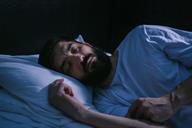Narcolepsy
Narcolepsy is a disorder that causes people to fall asleep suddenly and without control (have sleep attacks) during the daytime. It is a lifelong disorder. Narcolepsy disrupts the sleep cycle at night, which then causes daytime sleepiness.
What are the causes?
The cause of narcolepsy is not fully understood, but it may be related to:
- Low levels of hypocretin, a chemical (neurotransmitter) in the brain that controls sleep and wake cycles. Hypocretin imbalance may be caused by:
Infection, tumor, or injury in the area of the brain that controls sleep.
Exposure to poisons (toxins), such as heavy metals, pesticides, and secondhand smoke.
What are the signs or symptoms?
Symptoms of this condition include:
Excessive daytime sleepiness. This is the most common symptom and is usually the first symptom you will notice. This may affect your performance at work or school.
Sleep attacks. You may fall asleep in the middle of an activity, especially low-energy activities like reading or watching TV.
Feeling like you cannot think clearly and having trouble focusing or remembering things. You may also feel depressed.
Sudden muscle weakness (cataplexy). When this occurs, your speech may become slurred, or your knees may buckle. Cataplexy is usually triggered by surprise, anger, fear, or laughter.
Losing the ability to speak or move (sleep paralysis). This may occur just as you start to fall asleep or wake up. You will be aware of the paralysis. It usually lasts for just a few seconds or minutes.
Seeing, hearing, tasting, smelling, or feeling things that are not real (hallucinations). Hallucinations may occur with sleep paralysis. They can happen when you are falling asleep, waking up, or dozing.
Trouble staying asleep at night (insomnia) and restless sleep.
How is this diagnosed?
This condition may be diagnosed based on:
A physical exam to rule out any other problems that may be causing your symptoms. You may be asked to write down your sleeping patterns for several weeks in a sleep diary. This will help your health care provider make a diagnosis.
- Sleep studies that measure how well your REM sleep is regulated. These tests also measure your heart rate, breathing, movement, and brain waves. These tests include:
An overnight sleep study (polysomnogram).
A daytime sleep study that is done while you take several naps during the day (multiple sleep latency test, MSLT). This test measures how quickly you fall asleep and how quickly you enter REM sleep.
Removal of spinal fluid to measure hypocretin levels.
How is this treated?
There is no cure for this condition, but treatment can help relieve symptoms. Treatment may include:
- Lifestyle and sleeping strategies to help you cope with the condition, such as:
- Medicines. These may include:
Medicines that help keep you awake and alert (stimulants) to fight daytime sleepiness.
Medicines that treat depression (antidepressants). These may be used to treat cataplexy.
Sodium oxybate. This is a strong medicine to help you relax (sedative) that you may take at night. It can help control daytime sleepiness and cataplexy.
Other treatments may include mental health counseling or joining a support group.
Follow these instructions at home:
Sleeping habits

-
Get about 8 hours of sleep every night.
-
Go to sleep and get up at about the same time every day.
-
Keep your bedroom dark, quiet, and comfortable.
-
When you feel very tired, take short naps. Schedule naps so that you take them at about the same time every day.
- Before bedtime:
Activity
-
Get at least 20 minutes of exercise every day. This will help you sleep better at night and reduce daytime sleepiness.
-
Avoid exercising within 3 hours of bedtime.
-
Do not drive or use machinery if you are sleepy. If possible, take a nap before driving.
-
Do not swim or go out on the water without a life jacket.
Eating and drinking
-
Do not drink alcohol or caffeinated beverages within 4–5 hours of bedtime.
-
Do not eat a large meal before bedtime.
-
Eat meals at about the same times every day.
General instructions

-
Take over-the-counter and prescription medicines only as told by your health care provider.
-
Keep a sleep diary as told by your health care provider.
-
Tell your employer or teachers that you have narcolepsy. You may be able to adjust your schedule to include time for naps.
-
Do not use any products that contain nicotine or tobacco. These products include cigarettes, chewing tobacco, and vaping devices, such as e-cigarettes. If you need help quitting, ask your health care provider.
-
National Institute of Neurological Disorders and Stroke:
ninds.nih.gov
Contact a health care provider if:
-
Your symptoms are not getting better.
-
You have fast or irregular heartbeats (palpitations).
-
You are having a hard time determining what is real and what is not (psychosis).
These symptoms may be an emergency. Get help right away. Call 911.
Summary
-
Narcolepsy is a disorder that causes people to fall asleep suddenly and without control during the daytime (sleep attacks).
-
Narcolepsy is a lifelong disorder with no cure. Treatment can help relieve symptoms.
-
Go to sleep and get up at about the same time every day. Follow instructions about sleep and activities as told by your health care provider.
-
Take over-the-counter and prescription medicines only as told by your health care provider.
This information is not intended to replace advice given to you by your health care provider. Make sure you discuss any questions you have with your health care provider.

